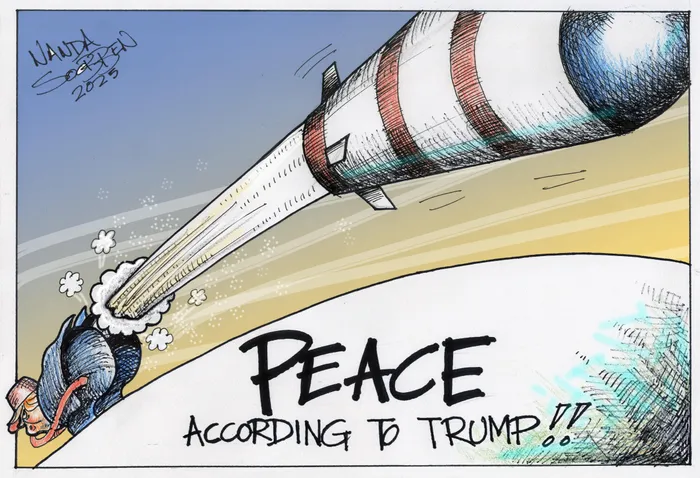Does long-term peace have a chance in the Israeli-Iranian conflict?
Threats to global stability

Nanda Soobben's take on the conflict.
Image: Nanda Soobben
AFTER nearly two weeks of exchanging airstrikes, Israel and Iran have agreed to the ceasefire that was brokered by Qatar and the United States. The US president, Donald Trump, confirmed early Tuesday that the ceasefire was now “in effect”, even though confusion remains over the precise details.
The war started when Israel launched airstrikes on Iran on June 13 in what the Israeli Prime Minister said was an operation geared towards preventing Iran from developing nuclear weapons.
The conflict between Israel and the post-1979 regime in Iran is as inevitable as day after night. The decades-old tit-for-tat between the two countries has been getting out of control in recent months. Before the ceasefire, the war was threatening the stability of the entire Middle East, and its ripple effects were already felt across the globe.
Iran is the third-largest producer of oil within the Organization of Petroleum Exporting Countries (OPEC). What this means is that its involvement in the war against Israel and the United States is highly likely to affect the price of oil.
The direct involvement of the United States saw Iran target the US military base in Qatar on Monday in retaliation. Iran cannot rely on states such as Syria in the region to support it other than what is left of its proxies. However, Hezbollah in Lebanon has been severely weakened, and the Houthis in Yemen appear to have been neutralized.
With Russia busy fighting Ukraine and the Assad family no longer in control of Syria, Iran cannot count on countries to defend it from Israeli and American aggression.
The American political scientist, Samuel P Huntington, predicted in 1996 that the primary source of conflict in the post-Cold War world would no longer be ideologically based, but cultural, or what he termed the “Clash of Civilizations.” The conflict between Israel and Iran is the epitome of this clash
The question now is: What is it going to take for lasting peace to prevail between these two sworn enemies? As the conflict escalates, the Israeli Prime Minister, Benjamin Netanyahu, and the U. S. President, Donald Trump, appear to lean more towards incapacitating Iran and forcing it to negotiate a nuclear deal from a position of weakness. This seems to be Trump’s and Netanyahu’s way of achieving peace through strength.
Israel and the US are also contemplating the idea of effecting a regime change in Iran. The US involvement in Iranian politics dates back to 1953, when the Central Intelligence Agency (CIA) sponsored a coup that overthrew a democratically elected government and replaced it with a pro-US monarchical government led by Shah Pahlavi.
What the hardline stance and aggression towards Iran reveal, then, is that, besides preventing it from becoming a nuclear threat, the US and Israel harbour the intentions of replacing a hostile government in Tehran with a government that is friendly towards Israel and the West.
Iran has become almost the only country in the Middle East that Israel sees as a real threat to its existence.
President Trump recently visited Saudi Arabia, Qatar, and the United Arab Emirates. All three Arab governments have friendly relations with the US and, by extension, are no longer hostile towards Israel. While on his recent state visit to the Middle East, Trump also met with the new Syrian leader, Ahmed al-Sharaa, marking a reset of the relations between the two countries.
With the US actively engaged in isolating Iran, none of its neighbouring states are expected to come to its rescue. The diplomatic isolation of Iran leaves Israel and the US not having to worry about another state defending Iran.
This is perhaps what Von Clausewitz had in mind when he remarked that “war is the continuation of politics by other means.” Von Clausewitz had observed that, as one aspect of political intercourse, war or a ‘military’ solution could not merely be a political act but a real political instrument to accomplish political ends. The end here is the peaceful coexistence of the Jewish state of Israel alongside its Muslim neighbours.
Ironically, in political language, the description of a solution to a political problem is referred to as a political solution. A political solution implies peaceful debate and arbitration as opposed to what is often called a military solution.
After the recent nuclear negotiations between the United States and Iran collapsed, Israel took a unilateral decision to attack Iran and target its nuclear infrastructure. Those attacks killed three senior Iranian military officers.
By the way, Israel is also a nuclear power that has not been challenged or given approval for possessing nuclear weapons.
Israel brazenly attacked Iran, knowing that it had the tacit approval of the West, in general, and the US, in particular. Israel and the Western governments have long feared that Iran is on the verge of becoming a nuclear power.
As expected, the United States joined Israel in the bombing of suspected nuclear sites in Iran. The Jewish lobby in the US is very influential, and there was no way the US could have stood by and watched Iran launch missiles at Israel.
For their part, Britain and the EU member states frantically tried to convince Iran to go back to the negotiating table and strike a nuclear deal with the US. Britain’s foreign secretary, David Lammy, argued that “now is the time to put a stop to the grave scenes in the Middle East and prevent a regional escalation that would benefit no one.”
The West has made it clear it won’t tolerate a nuclear power that is a sworn enemy of Israel.
Last week, the Israeli ambassador to the United Nations reminded the world that Iran’s Supreme spiritual leader, the Ayatollah Ali Khomeini, has repeatedly called for the destruction of Israel. It is for this reason Lammy reasoned that, “We are determined that Iran must never have a nuclear weapon. However, one could argue that the Western nations have double standards for allowing Israel to possess nuclear weapons while denying Iran.
The two countries traded deadly airstrikes before the ceasefire came into effect yesterday. The war has cost lives and caused massive damage to infrastructure in both countries. Last Saturday, the United States also launched airstrikes at Iran’s three nuclear sites, which President Trump described as “monumental” and a “spectacular military success.”
In the history of humankind, wars have never lasted forever. As the foreign ministers from Britain, the EU member states and Qatar engage with Iran’s foreign minister, the world is holding its breath for a diplomatic solution that guarantees lasting and long-term peace.
For decades, the Jewish state of Israel and the Islamic state of Iran have viewed each other as bitter foes, so much so that each views the other as an existential threat. This conflict dates back to the early 1980s, and the accusations from both sides are galore. Each side is making serious accusations about the other.
Both countries accuse each other of harbouring genocidal intentions. This mutual suspicion is rooted in the deep hatred, lack of trust, hostile rhetoric from the leaders of both countries, and their brazen actions.
Iran accuses Israel of conducting a genocide of Palestinians in the Gaza Strip and of unlawful political assassinations. In recent months, Israel claimed responsibility for the killings of Hamas’ leader, Ismail Haniyeh, and Hezbollah’s leader, Hassan Nasrallah. Haniyeh was assassinated in Tehran after attending the inauguration of Iran’s president, which Iran viewed as a violation of its sovereignty and an act of aggression against its guest. Nasrallah was assassinated in Lebanon.
Israel accuses Iran of being a threat not only to the Jewish state but also to the stability of the entire Middle East. Israel blames Iran for sponsoring terrorism. Israel and its close ally, the United States, accuse Iran of supporting and funding what they view as terrorist organizations, that is, Hezbollah in Lebanon, the Houthis in Yemen, and Hamas in Gaza.
When the dust settles, it will become obvious why Israel and the United States are attacking Iran. The main objective is to weaken Iran with the aim of forcing a regime change and establishing a new regime that will never pose any existential threat to the Jewish state of Israel.
What Iran is going through is almost a case of déjà vu. Back in the early 2000s, the US attacked Iraq because of suspicions that it possessed weapons of mass destruction. To date, no weapons of mass destruction have been found. The sole intent of the invasion of Iraq was to effect a regime change.

Zakhele Collison Ndlovu
Image: File
Zakhele Collison Ndlovu is a political analyst at the University of KwaZulu-Natal.
** The views expressed do not necessarily reflect the views of IOL or Independent Media.